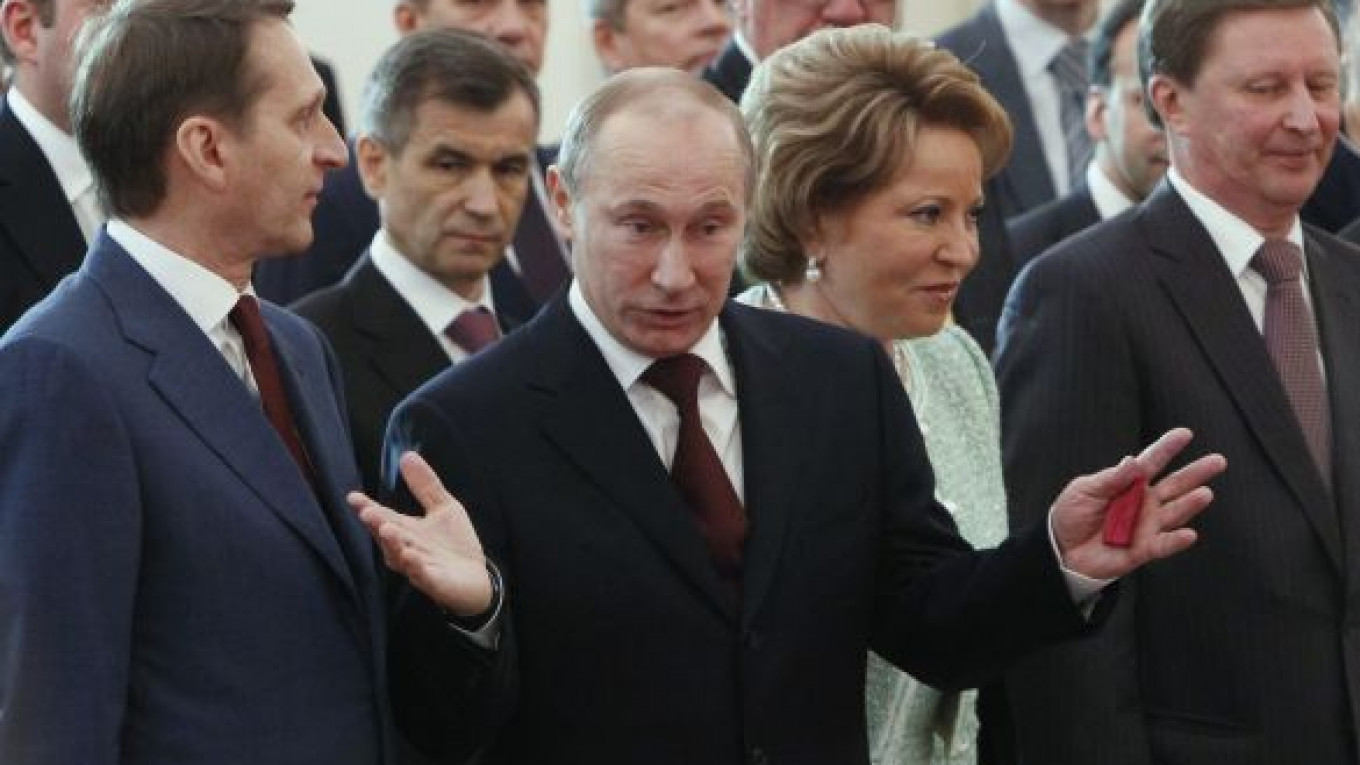Prime Minister Vladimir Putin and President Dmitry Medvedev seemingly completed their job swap Tuesday when Putin announced that he would hand over control of his United Russia party to Medvedev after both trade their government positions in May.
Putin told senior United Russia activists that he will give up his post as party chairman after he returns to the presidency on May 7 and suggested that they elect future prime minister Medvedev to take over at a special convention later next month.
Although widely expected, the move raised eyebrows, and analysts predicted that the party will have to continue its uneasy co-existence with Putin's All-Russia People's Front.
Putin has headed United Russia since April 2008, when he agreed to become party chairman without actually joining it. At the time this was seen as a move to shore up his political power after moving from the presidency to the post of prime minister.
On Tuesday, Putin said the country's political practice dictates that the president remain a nonparty figure.
"The Constitution does not ban the president from being a member of a party, but in the spirit of our politics the president is a consolidating figure for all political forces, for all citizens," he said.
Putin added that Medvedev, whom he has promised to nominate for prime minister, would need to head the party to effectively lead the government.
"It is worldwide practice that a government is backed by a parliamentary majority," he said, to a transcript on his website.
But political experts pointed out that heading the increasingly unpopular "party of power" was hardly a boon for Medvedev, whose political independence has been questioned after he announced last September that he was ceding the presidency to his predecessor and mentor because of his higher popularity ratings.
Putin began to distance himself from United Russia a year ago, when he set up the People's Front, which brought nonparty members onto party lists for the December parliamentary elections. In his campaign for the March presidential election Putin relied much more on the Front than on the party.
Medvedev, who also is not a party member and has avoided any close association with United Russia during his presidency, was made head of the party list for the Duma elections, which saw the party's support slide from 64 percent to 49 percent compared with the previous elections.
It was unclear whether Medvedev would follow Putin's example and head the party without being a member.
Boris Gryzlov, who is United Russia's second in command, promised at Tuesday's meeting that the party would elect Medvedev unanimously.
"The party convention is in May, and [Putin's] suggestion to elect Dmitry Medvedev will be supported by all … delegates," he said.
Gryzlov also refuted recent media reports that predict the party's imminent split or collapse.
"They see something pink on the horizon, but that's dawn and not sunset," he said.
Media reports suggested last week that Putin would abandon United Russia in favor of his People's Front.
The speculation centered on United Russia's Duma faction, whose 238 members form a majority in the 450-member lower house. But 80 of them are not party members, having been elected through the People's Front.
Gryzlov raised eyebrows Tuesday by calling on those deputies to give up their independence.
"I think it would be right if they joined the party as members. This would strengthen our faction's unity," he said.
But Duma Deputy Vladimir Gutenev, a senior Front official, immediately rejected the idea, Ekho Moskvy radio that he would not join the party because he saw "no problem in the mutual cooperation."
Gleb Pavlovsky, a political analyst and former Kremlin insider, said United Russia's coexistence with Putin's Front was "a strange construction" but predicted that the problem will continue to exist.
"Putin does not want to be without his political machine," Pavlovsky told The Moscow Times.
A Message from The Moscow Times:
Dear readers,
We are facing unprecedented challenges. Russia's Prosecutor General's Office has designated The Moscow Times as an "undesirable" organization, criminalizing our work and putting our staff at risk of prosecution. This follows our earlier unjust labeling as a "foreign agent."
These actions are direct attempts to silence independent journalism in Russia. The authorities claim our work "discredits the decisions of the Russian leadership." We see things differently: we strive to provide accurate, unbiased reporting on Russia.
We, the journalists of The Moscow Times, refuse to be silenced. But to continue our work, we need your help.
Your support, no matter how small, makes a world of difference. If you can, please support us monthly starting from just $2. It's quick to set up, and every contribution makes a significant impact.
By supporting The Moscow Times, you're defending open, independent journalism in the face of repression. Thank you for standing with us.
Remind me later.


